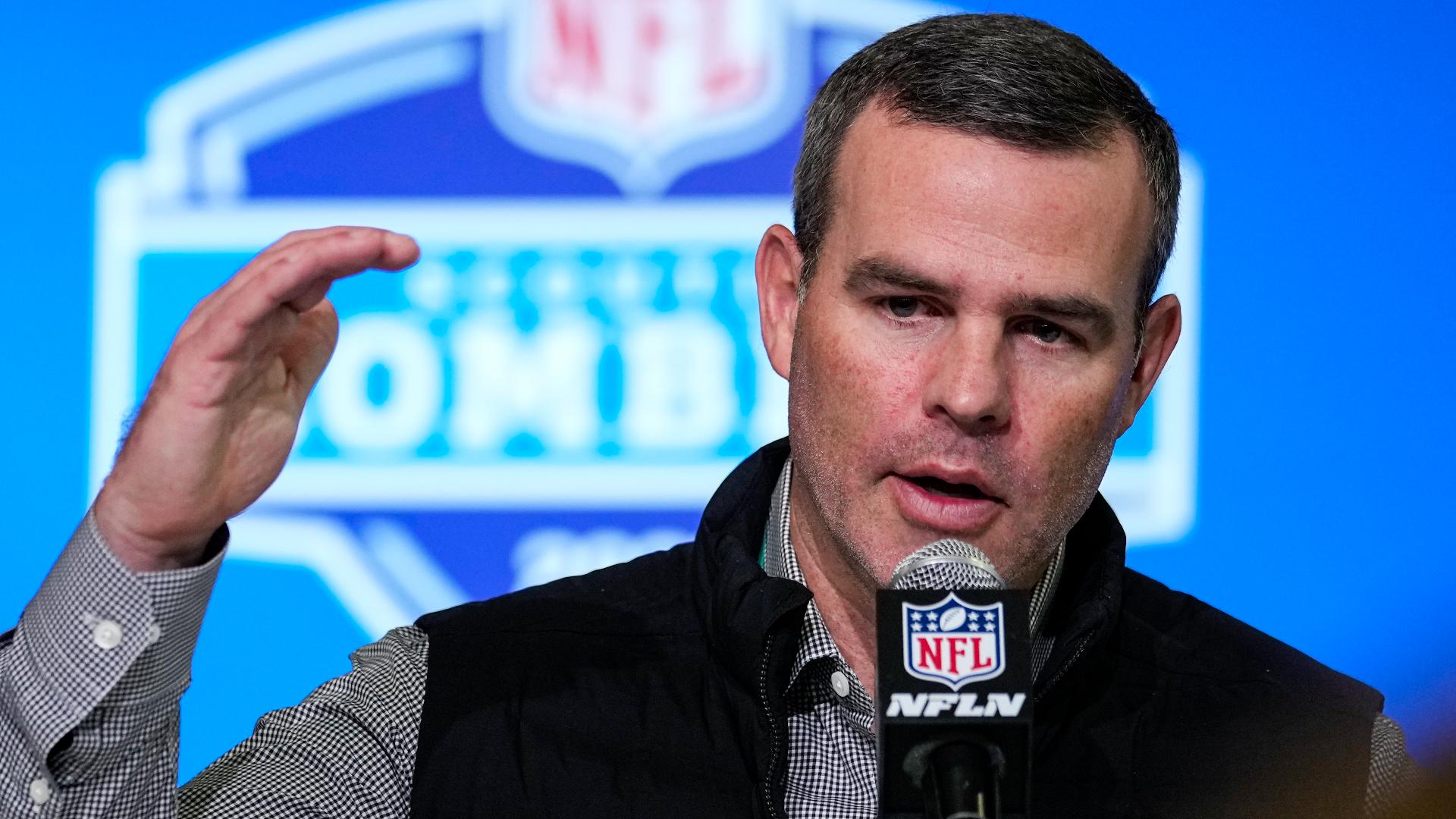ORCHARD PARK, N.Y. — Every year leading up to the the NFL draft, Buffalo Bills general manager Brandon Beane reminds everyone there’s no guarantee of filling the team’s biggest needs in the early rounds because he’s fixed on following Buffalo’s draft board.
And every year, once Beane’s final selection has been submitted, the holes in Buffalo’s roster appear filled — on paper, at least.
“Are you saying I’m a liar?” Beane said, cracking a smile following the third round on Friday night.
No, but it wouldn’t be advisable to sit across from Buffalo’s eighth-year GM in a poker game.
Beane hit the reset button this offseason by purging a bloated payroll, making the team younger and trading receiver Stefon Diggs. Nonetheless, the four-time defending AFC East champions have fewer question marks than Thursday, when a jittery fanbase panicked each time Buffalo traded back from its original 28th pick.
Beane showed uncharacteristic patience by refusing to mortgage Buffalo’s limited draft capital by trading up for a shot at selecting a top receiver prospect. He placed faith in his board, trading back twice in a bid to improve Buffalo’s roster at numerous spots.
And Beane still addressed Buffalo's top priority by selecting Florida State receiver Keon Coleman at No. 33.
The 6-foot-3, 213-pound Coleman might not replace the production Buffalo lost in Diggs and Gabe Davis, who departed in free agency. He still has the potential to provide Josh Allen a physical, sure-handed target on an offense that showed promising signs of balance last season with second-year receiver Khalil Shakir, rookie tight end Dalton Kincaid and second-year running back James Cook.
Beane then checked off Buffalo’s next two immediate needs by selecting Utah safety Cole Bishop at No. 60 and Duke defensive tackle DeWayne Carter at 95. The Bills wouldn’t have been in position to select Carter if not for a trade with Kansas City in which the Chiefs moved up from 32 to 28, with Buffalo going from 133 to 95 and 248 to 221.
Bishop steps into a secondary that stands to lose its long-term safety tandem of Jordan Poyer (free agency) and Micah Hyde (considering retirement). Carter, a four-year starter, fills a depth need on a defensive front that lost Tim Settle, Jordan Phillips and Linval Joseph.
Beane acknowledged placing an emphasis on team-specific needs in the draft as long as the players provided value at the spots where they were selected.
For example, he had several receivers to choose from in the 28-33 range, before going with Coleman.
Things were dicier when it came to selecting Bishop, the last player Beane said the Bills had issued a second-round grade.
“I think it was more dramatic just because of the countdown,” Beane said.
The Bills were rejected in their bid to trade up, and Beane waited as Bishop continued to fall.
“I wasn’t patient. It’s just that no one took my call or they took it, but politely declined,” he said. “That’s what I said upstairs. We struck out and we won because no one would deal with us.”
UTAH REUNION
Beane recalled a conversation with Bishop at the Senior Bowl in which the safety said he got the better of tight end Dalton Kincaid in practice during their two years together at Utah in 2021 and ’22. Beane immediately checked in with Kincaid, who was Buffalo’s first-round pick last year.
“He said, ‘This kid, he’s not lying. He got me more than I got him,’” Beane said, referring to Kincaid’s response.
“Probably one of the most consensus players on our board,” Beane said of Bishop. “Everyone saw exactly the same thing, easy to put him on our board.”
PIPE DOWN
With his family loudly celebrating in the background, Carter excused himself from a Zoom call with Buffalo reporters to ask everyone to pipe down. The moment was a glimpse into the leadership abilities of the 23-year-old, a three-time Duke captain.
“At the end of the day my dad always told me, ‘A closed mouth doesn’t get fed,’” Carter said. “You can’t be afraid to open your mouth and say what you need done. So that’s really where it comes from. My upbringing.”
PATHWAY PICK
Buffalo closed the draft by selecting offensive tackle Travis Clayton, a former rugby player who participated in the NFL’s International Pathway Program. The 23-year-old is from Basingstoke, England, and left the U.K. to participate in the NFL Academy in 2019.
Aside from rugby, the 6-foot-7, 303-pound Clayton has tried boxing, soccer, rowing, skeleton and tennis. He was in attendance at the draft in Detroit to hear his name announced. As a pathway program grad, Clayton won't count against Buffalo's roster if he fails to make the cut.
Buffalo traded one of its four fifth-round picks (144) to Chicago for a fourth-rounder next year.

